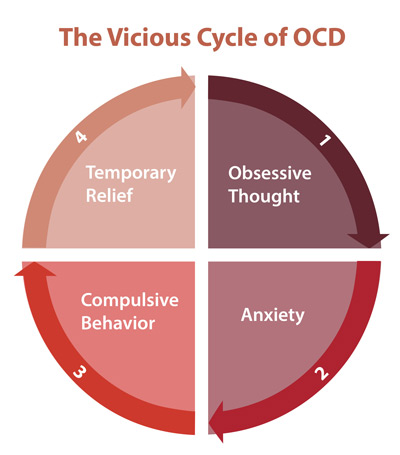 |
| A favorite meme of mine, regarding people who claim they have OCD without diagnoses |
The reality is that the symptoms of OCD are not funny or "quirky". They affect your everyday life, relationships and experience in ways no one except those who have OCD will understand. When I was diagnosed, I searched for a place where someone who actually knew what I was going through shared their own experience. Now I have the opportunity to do the same.

OCD is a mental health illness that involves uncontrollable thoughts and obsessions that occur everyday. Fears center around certain themes, such as germs, order, grades or even the exact measurement of your books on the bookshelf. The brain regenerates repetitive, powerful thoughts that cause extreme amounts of anxiety. These thoughts lead to compulsions, actions performed to temporarily relieve the anxiety.
One in forty people have clinical OCD, where the symptoms affect your day to day live severely. This prevalence in the population draws the important questions that scientists ask, What causes OCD?
Researchers have discovered that certain areas of the brain function differently in those who have OCD compared to those who do not. These parts of the brain use a neurotransmitter called Serotonin to communicate. Communication errors in parts of the brain such as the orbitofrontal cortex, the anterior cingulate cortex (both in the front of the brain), the striatum, and the thalamus (deeper parts of the brain all have been found by researchers to lead to OCD symptoms.
 |
| The parts of the brain linked to OCD |
 |
| This exemplifies how SSRIs work |
OCD affects millions of people in our country. The stigmas surrounding mental health in the United States and around the world are extremely harmful and degrading. I wish in eighth grade I was taken more seriously with my diagnoses and provided more resources as to what my illness actually is. I have heard so many people, friends included, claim that they are "so OCD" because they like a clean room or color coded notes. Remember the biology behind this illness. Do not claim to have something that is an extremely difficult illness to live with for those who have it. And most importantly, support those who are actually living with it.
I found your analysis of the societal understanding of OCD to be very interesting. Is there a spectrum of OCD-like tendencies, or is it something that people either have or don't? It seems to me like people often mistakenly confuse minor OCD-like symptoms (unknowingly or on purpose) with having clinical OCD. I would also be interested to see what proportion of people living with clinical OCD have been diagnosed.
ReplyDeleteI liked the meme at the beginning :)
ReplyDeleteI thought that this was a very interesting read, very informative as well. I agree that people should definitely be more aware when claiming they suffer from this when they truly are not. I, too, struggle with these compulsive behaviors and obsessive thoughts and it's nice to know the biology behind it all.
ReplyDeleteI really enjoyed reading this and I found the science behind obsessive compulsive behavior to be super interesting! I especially liked that you clearly outlined the difference between saying "I'm so OCD" and actually being diagnosed with OCD.
ReplyDeleteI never understood what OCD did to people who have this disease. Now that you have explained it, I understand how difficult the disease must be to deal with. I am interested in what genes might be involved in OCD.
ReplyDeleteI also liked the meme at the beginning :) Very informative article! Loved it
ReplyDelete